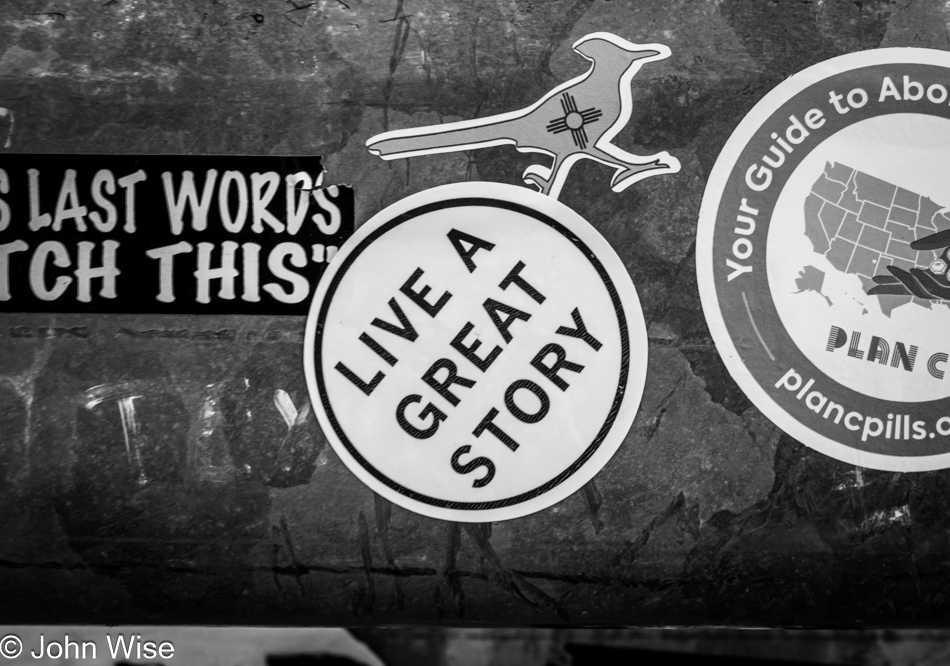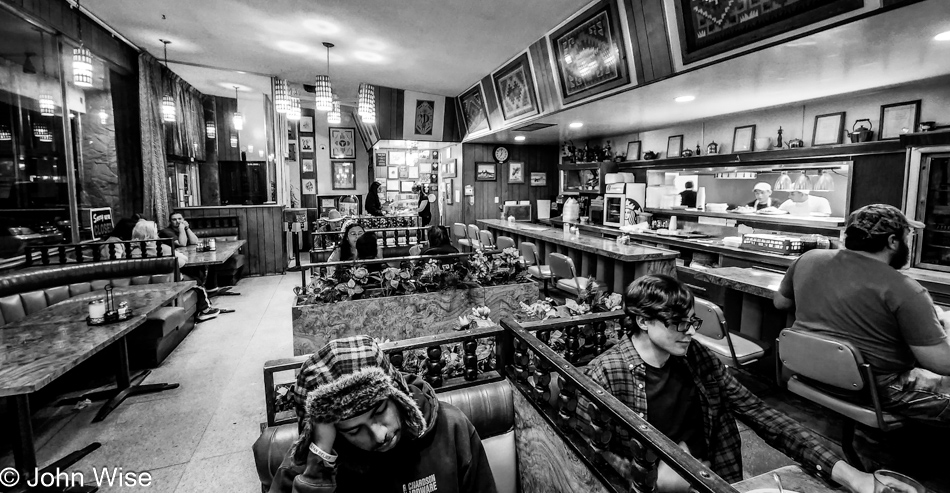
These strange fellows are about to cross a vast delta of time between them as this 20-year-old guy and a nearly 60-year-old man leave Phoenix, Arizona, on a road trip that will be all about getting out of routine and expectations. Curiosity is the bridge that connects Carlos and me. When I first spoke with him, he was carrying a copy of Les Fleurs du Mal (The Flowers of Evil) by Charles Baudelaire that I’d read around the time I was his age. This commonality opened a door, and soon we were talking about literature, philosophy, and art. After some months of the occasional chat during his breaks at Starbucks or even while on shift, he quit to take another job, and I was certain our connection would be lost.

As Carlos was about to move on down the proverbial road, he asked for my number which I thought was quaint though a bit silly because we live in America, disconnected, not just from one another but from ourselves. I entertained him by giving him my number and wished him good luck. Obviously, he reached out, which I found peculiar considering I’m three times his age, which would imply a chasm of cultural distance between us. Ah, this must be a one-time anomaly to satisfy his curiosity about cameras (he had spoken about his interest in photography before). When we met, he asked about must-visit places in Los Angeles and enquired about a restaurant recommendation in Phoenix where he might try something out of the ordinary. I sent him to a local Peruvian restaurant, told him of Kinokuniya bookstore in Little Tokyo over in L.A., and suggested he temper his expectations of what he thinks he needs regarding camera gear until he knows if he has a real interest or if it’s a passing fancy.

After a few of these kinds of meetings, I gave Carlos an old Canon camera body I knew I would never use again and lent him a lens for him to try his hand at capturing his world. Over some weeks, I’d swap out lenses with him so he could experiment with different perspectives. We talked of possibly heading out for a day of photography, maybe even a weekend in Los Angeles. A week or maybe two would pass before I got another text message asking if we could meet up as he had questions about something or other. This continued until a little more than a week ago when he asked if my offer to travel was still open. Five consecutive days had opened up in his work schedule, but I had to let him know that there was no way I was going to L.A. for that period of time: I’d lose my mind – those days in Southern California with the traffic I’ve grown to abhor would pummel me. However, I told him if he were open to somewhere random, we might be able to work something out. His answer surprised me; it was a simple and concise “sure!”

Here we are on the first day of that five-day outing, hoping we might fall into some flow or else we’ll be doomed to end this expedition shortly after its beginning. This inkling of doubt nagged at the back of my head because how in god’s green earth (black & white in this instance) would a 20-year-old deal with hanging out with a potentially grumpy old man stricken with ugly fixed habits and a general intolerance for bullshit? On the other hand, how would I deal with an impatient and possibly petulant young man I only knew from brief encounters at a nearby Starbucks? About the path we’re taking, it was just a dozen hours prior to our departure that I fixed on one of two potential directions: north or east. We are heading east, and at this juncture in our trip, we are crossing the Little Colorado River near Springerville, Arizona, on U.S. Highway 60.

How appropriate, a young buck in nature and a young buck in my car venturing into nature. This deer is looking over his harem, which is off to the right and out of view in this photo; I have no way of knowing what he’s thinking. In one of the images above this, Carlos is walking through tall grass; it was here that he shared his first epiphany of sorts with me: he was struck by the rolling hills, the winds driving the grasses in patterns reflective of the air currents, and how far the horizon stretching beyond his purview. He voiced his wish that he could see what was beyond the hilltops, so I pulled over to a gate without a “No Trespassing” sign, and off he went to the other side. When he returned from looking into the mystery, he expressed a sense of awe. Maybe this guy won’t annoy me into taking him home as soon as tomorrow morning, after all.

With his display of potential, we entered into another state, quite literally. Carlos was about to visit New Mexico for the first time and put on a face of excitement. I guess it’s part of the generation gap and will contribute to my own learning experience regarding what modern youth is about. While a polite smile would have sufficed, anyone could wear that, and now this moment will forever be frozen into the story of Carlos as he crossed a barrier to finding himself elsewhere and that this was the appropriate gesture for entering new territory, physically, experientially, and intellectually.

His enthusiasm quickly came crashing back to earth when I explained that we were going to squat in this abandoned motel in Quemado, New Mexico, because not only was it free, but there were still a few amenities that would make our stay comfortable.

I chose this room for my young companion because I felt the eagle above the bed best represented his potential to lead a life free to soar over the world he’s yet to create for himself. Yet it appeared that Carlos may not really be ready for true adventure because I found it impossible to convince him to enter this liminal space. Was it the threat of what might be hiding around the corner in a bathroom of unknown surprises? Come on, Carlos, I plead, it is this sense of liminality that will have you finding another essential part of who you are. For those who would like to understand this idea without interrupting my riveting tale of personal growth by consulting a search engine, I offer the following:
In anthropology, liminality (from the Latin word for threshold) is the quality of ambiguity or disorientation that occurs in the middle stage of a rite of passage, when participants no longer hold their pre-ritual status but have not yet begun the transition to the status they will hold when the rite is complete. During a rite’s liminal stage, participants “stand at the threshold” between their previous way of structuring their identity, time, or community and a new way (which completing the rite establishes). — from Wikipedia.

Hey Carlos, is that the sound of panic creeping into your voice as you ask if I’m really going to take these Dollar Store Christmas Mugs? Of course, I’m going to take these great souvenirs; the alternative is to visit some sickly bright gift shop somewhere and buy stuff neither of us needs. Might as well collect some free things to mark the first day of our adventure together. Hey, you wondering, too what’s through that doorway in the background on the right?

There was no phone signal out here, and racing over to the payphone to call home for a rescue proved futile for him. In what crazy universe does one believe payphones are still a thing?

Oh drats, the local diner is closed, too! I guess we’ll just have to bag a dog or something for dinner, but don’t worry, Carlos, I know how to prepare just about anything. Heck, I got you out here, didn’t I?

With his vacation quickly turning dark and the worries of his mom possibly coming true, Carlos felt he needed to reconnect with the god he’s been neglecting, so off we went to the 24/7 local Catholic Church. Appropriately enough, it was Sunday, and he was able to pray and beg for his salvation. I don’t exactly know where his imagination was going, but he asked me to share the following with his mother:
May this Communion, O Lord, cleanse us of wrongdoing and make us heirs to the joy of heaven through Christ our Lord.

Oh look, we’ve found dinner without having to lift a finger trying to capture something fresh.

We left the alternative dimension of Quemado (translation: burnt) and Carlos’s nightmares behind and headed to Pie Town. Certain that winter spelled NO PIE for us, I was surprised to find the Pie-O-Neer Cafe open. Seriously surprised because I had been certain this place was shuttered after being up for sale for quite some time. Alrighty then, we need to step right in as they were “Open For Our Pleasure.”

Carlos explained, “Yes, this is, in fact, my face of pleasure. Do you have a problem?”

It was now time to remind my young travel companion that he had foolishly entered New Mexico with me, the home of Roswell where the aliens be. Just behind that large dark cloud is the mothership about to whisk him away for the kind of probing that will defy his worse fears, even those he was entertaining back in Quemado when he thought I might be serious about staying in an abandoned motel. Strangely, he was calm about the whole thing, telling me he felt nearly complete after enjoying that apple/green chile pie with homemade vanilla ice cream back in Pie Town.

All that was left was for me to tap into the VLA (Very Large Array) here in Datil to inform my overlords that the initiate was ready and happy to join the aliens for whatever adventure awaited him. Hours earlier I had been thinking I may not get along with Carlos in the long run, but now I’m almost sad to see him go.

This may not have been a Great Story, but it’s the one I mustered all these days after our road trip into unknown territories. At least as far as Carlos is concerned. Had I been taking notes during our outing, I might have had some factual details that didn’t veer into absurdity, but this is all I have.

Hopefully, dinner at El Camino Restaurant in Socorro will be the elixir to revive me and allow color to return to our world. We’ve driven 376 miles to arrive in the middle of nowhere, which seemed like a great idea to me when planning this trip, but looking at Carlos here holding his head in despair, I have to question my thinking about this itinerary. Maybe it’s just an age-gap thing?


